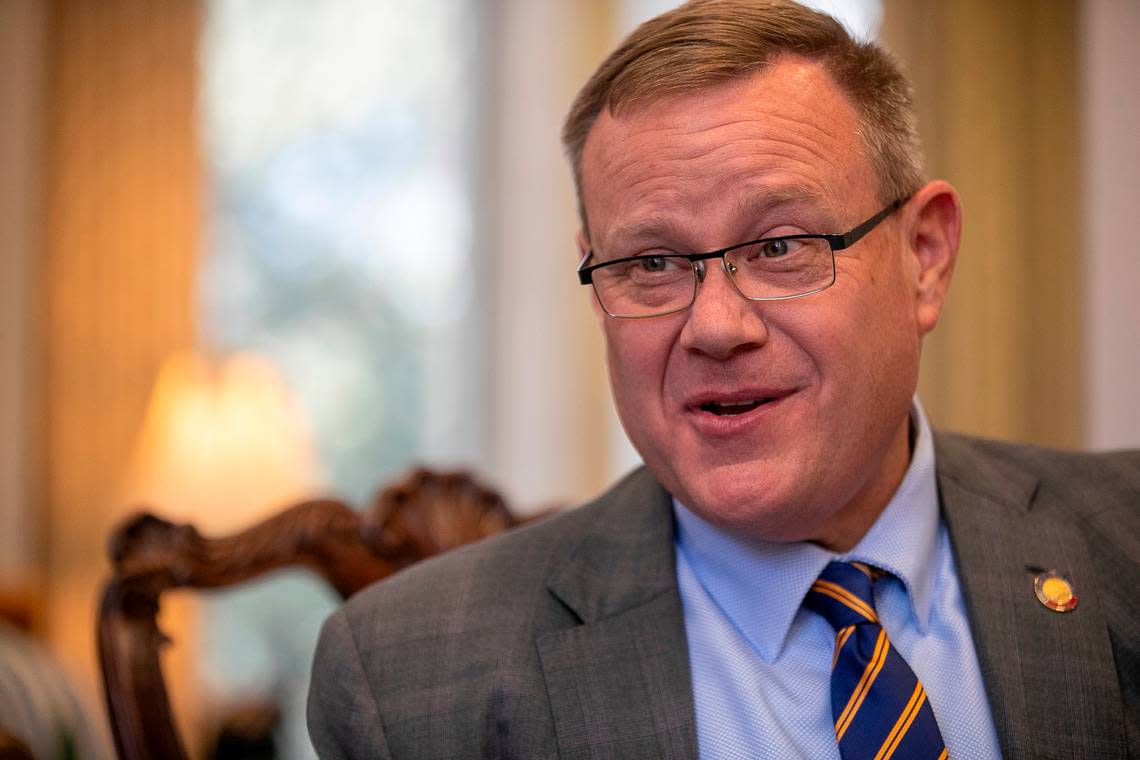More changes to the balance of power in NC are in the works, Republican leaders say
A shift in power this year in favor of Republicans at the North Carolina General Assembly could mean lasting changes to the balance of power in the state.
For the past several years, the Republican-majority legislature has worked to take power away from Democratic Gov. Roy Cooper and his successors. North Carolina’s government is already heavy on legislative power.
A new state law that started on Jan. 1 limits Cooper’s and future governors’ powers to issue and continue executive orders. That became law as part of a 2021 state budget that Cooper signed with the caveat that the bill’s “good outweighs the bad.”
It was the final move of a pandemic-long battle for power after Cooper put limits on North Carolina people and businesses in his COVID-19 response.
Or so it seemed at the time.
Republicans are planning to try to make more changes to the way power is distributed in the state, House Speaker Tim Moore said Thursday. And his Senate counterpart, Phil Berger, said he’s concerned about the “accumulation of power in the hands of one person,” the governor.
Limiting NC governor power
The News & Observer asked Moore on Thursday what bills the House is planning to move soon.
“I would say that there will be some separation of powers issues,” Moore said, declining to give specifics. Pressed if it was about Cooper’s powers, he said it would be about “restoring the appropriate balance of powers to the people.”
Moore added that “you may see a lot of those things dealt with in the budget.”
That sets the stage for the state budget process, which kicked off with committee meetings this week, to be tied to policy, not just appropriating taxpayers’ money.

Senate leader Phil Berger told reporters Thursday that he would like to see a “rebalance” of powers, declining to give specifics.
Legislation that took effect in January requires the governor to more often get agreement from the rest of the Council of State, and even from the legislature, for some executive orders.
“I’d be interested in looking overall — remember, North Carolina is a state that the executive is not just the governor,” Berger said. “And whereas in other states, the executive is the governor, and maybe the attorney general, and maybe the treasurer, In North Carolina, the executive is really spread out.”
The governor is one of 10 Council of State members along with the attorney general, lieutenant governor, state auditor, secretary of state, superintendent of public instruction, insurance commissioner, treasurer, labor commission and agriculture commissioner.
“Historically, North Carolinians have had a healthy concern about the accumulation of power in the hands of one person. That’s the reason the executive [branch] is spread like it is,” Berger said.
“I think that, in my opinion, is at the core of the rebalancing that needs to take place. And what we saw in COVID was a significant accumulation of power in the hands of one individual — which I think long-term is inconsistent with our history, and not consistent with our form of government,” he said.
House Rules changes
With 30 Republicans and 20 Democrats, the Senate has a Republican supermajority, which is the three-fifths of votes that is enough to override a veto from Cooper. The House has 71 Republicans and 49 Democrats, leaving Republicans one vote short of the 72 votes needed for a supermajority.
Already, a handful of more moderate Democrats have been given committee leadership roles and have voted with Republicans, or even co-sponsored a Republican bill, as Rep. Shelly Willingham did for the anti-rioting bill that passed the House this week.
Also at play are this session’s rules for the House, which are still temporary and give Moore the power to bring bills to the floor for a vote without notice, providing a clear path for veto overrides. However, Moore told reporters in January that he would tell House members when there will be voting sessions. On Thursday, Moore told The N&O that the permanent rules will come up for a vote on the House floor on Wednesday.
He also said he “made a concession” but said “I can’t tell you” exactly what it says.
“I added a provision on veto overrides,” Moore said.

